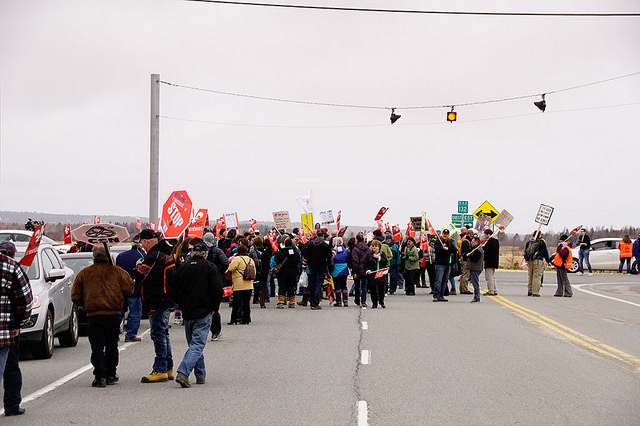rabble is expanding our Parliamentary Bureau and we need your help! Support us on Patreon today!
Quebec public service unions have been in contract negotiations with the government for nearly a year. Last month the Quebec Liberal government, which had proudly not given an inch so far in negotiations, budged in November.
Salaries have been the main point of contention. The government has been offering an increase of three per cent over five years with a freeze for the first two years. Unions were looking for an increase of 13.5 per cent over three years, or 4.5 per cent per year.
Trying to reach a deal
The unions representing 400,000 employees affected by these negotiations, together known as the Front commun (Common Front), took this as a step in the right direction.
“This movement at the negotiating table is a direct result of our historic mobilization and strike movement initiated but the Front commun,” read a press release from the group.
But the was not enough and the Front commun crafted a counter-offer.
While crafting their response, the Front commun cancelled much-anticipated strike actions planned for December 1, 2 and 3. This was done as an act of good faith to the government to show they were willing to ease up the pressure for concessions at the bargaining table. A major day of strike was rescheduled for December 9 if an agreement were not reached by then. This was seen by some as a counter-productive de-escalation.
When they submitted their counter-offer on November 18 the government spent little time, a mere 30 minutes it is reported, before throwing it in the trash in outright rejection.
Later in November, negotiators in the government were optimistic, hinting that a deal was near.
But no agreement has been made and the window of possibility for such a deal is closing fast; the Quebec National Assembly closes session for the holidays at the end of this week, on Friday December 4.
December 9, if no agreement has been reached, will be a loud day on streets around La Belle Province.
Parts of the broad mobilization
There have been a number of players taking oppositional stands to the government.
Students went on strikes in March and April trying to spur unions into action, and have held limited strikes this fall. ASSÉ, the radical umbrella group of student associations, has had a strengthened mandate to mobilize its constituents this semester.
Several community groups, like FRAPRU (focused on housing), have persistently held protest actions for many months. The Main Rouge (Red Hand Coalition, full name: Coalition Against User Fees and Privatisation of Public Services) organized a large anti-austerity protest on November 27 in Montreal.
Parents this fall formed human chains around schools to symbolically protect them from budget cuts.
These actions have often been separate from union mobilization, though some lines of communication have formed and collaboration has been seen. For the December 9 labour strikes, protests are being organized for the night before and the night of by non-union groups.
Critical perspectives
This does not mean that the various players always agree on tactics. In fact, disagreement is quite common.
Some have been asking, given all the mobilization, what could happen if the various groups were to join forces.
Éric Sédition, active with Industrial Workers of the World, notes that 525,000 government workers could be on strike, along with a mobilized contingent of 1,300 community groups, dozens of thousands of students, and many parents. A special law in Quebec prohibits certain forms of strike action, but, Sédition asks, “How long do you think a government can stand facing such mobilization while its state apparatus is paralyzed? Seven days? Two weeks at most?”
However, there is little indication the the unions of the Front commun are on board at this time for such actions, which may be referred to a as a “grève sociale” (a social strike).
The group Printemps 2015 (Spring 2015), which was a focal point of anti-austerity unrest during winter and spring protests, has voiced their discontent with the strategy of Front commun unions.
“We refuse that our anger be stifled by union bosses who do not listen to their members nor their allies,” reads a section from the event description of a protest Printemps 2015 has called for the night of the union strike, December 9. The group states that “the struggle does not end with a [labour] agreement, signed or not.” While union leaders may agree with this sentiment in principle, the mobilization they are coordinating is aimed squarely at contract negotiations.
An uneasy dynamic persists between government, the major public sector unions, and the anti-austerity movement more broadly. This has been the case for most of the last year, and it will play out leading up to and following a loud day on December 9.
David Gray-Donald is a freelance journalist and community organizer in Montreal and Toronto.
Photo: flickr/Confédération des syndicats nationaux



